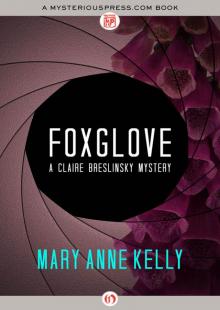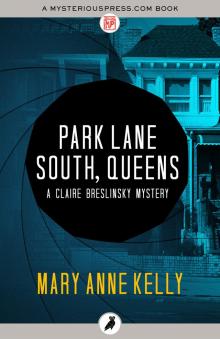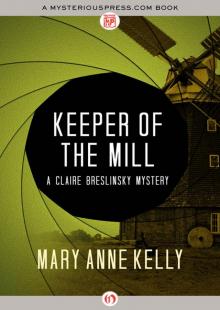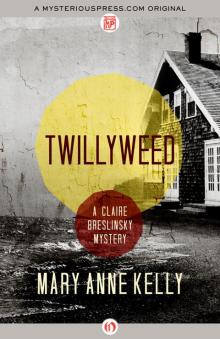- Home
- Mary Anne Kelly
Foxglove Page 5
Foxglove Read online
Page 5
“Over my dead body.”
“Good. Then I shall.”
“Good. Hand me that celery. Where’s Stefan?”
“Some meeting or other. You want this dill?”
“Yes. Now. What else?”
“How about this bread? It’s hard as a rock.”
“Give it here. I’ll do something with it.”
“You’re a rip,” said Carmela. “May I have a soda?”
“Just don’t take Johnny’s last Coca Cola Classic. He thinks it’s the Chateau Pumpernickel of sodas. On second thought, help yourself.”
“Ooolala. Trouble in paradise?”
“Don’t be so pleased, if you don’t mind.” Her fingers, she noticed, were trembling. “I’ll fry up some croutons.”
“‘I’ll fry up some croutons!’ If my husband were in the living room with Portia McTavish I’d be more likely to be making martinis.”
“Yeah. Well, that’s the difference between me and you.”
“Honey?” Johnny stood at the door. “Oh, hello, Carmela.”
“Don’t get so excited,” Carmela snorted, “I’m leaving after supper.”
Johnny smiled, preoccupied. “I was just thinking. Should we ask Portia to stay? Considering everything?”
“Considering what?” Claire glared at him.
“Well. She was Theresa Dover’s best friend.”
“I hardly think that, Johnny.” Claire made a face like bad fish. “I hardly think Tree Dover’s best friend would be laughing it up in my living room while Tree was still open in her coffin.”
“Laughing it up?”
“One thing I love about men,” cut in Carmela, “is their abject innocence when it comes to vile women.”
“Oh good heavens!” Portia stood behind Johnny. “What an absolute treasure of a kitchen!”
Claire said nothing. If this was going to be Johnny’s friend, let him bother.
He jumped aside, elevating his great thick arms about himself in presentation. She must have heard Carmela. She couldn’t possibly not have.
Portia smiled innocently at all of them. Was she really dense? Or did she simply not give a damn?
“Portia dear,” said Carmela, tipping her cheek in a benevolent Auntie Mame, “how delightful to see you again. And in such glowing good health!” She did not get up. Portia had to bend down.
“Ah, Carmela! Imagine running into you here.”
“Imagine what?” Carmela said to no one. “She is my sister, after all.”
“What is that lovely aroma?” Portia sniffed the air.
“That,” Johnny said out of the side of his mouth, “is my wife’s great cooking.”
Claire did not look up. She continued grating Emmentaler cheese into sour cream. But she could feel her shoulders loosen. She could feel herself relax enough to remember to take the pie crust out of the freezer and throw it into the oven to defrost. One thing she would not do was to chatter politely with them and make everyone feel all right, the way she usually would have done. She had Tree Dover’s little girl upstairs, motherless. That gave her some severity, some dark truth that she wouldn’t give up. She would hold onto her feelings of hurt for as long as she bloody well felt like it. And they could all go jump in a lake. As it always is, when you feel your most indisposed to being kind, the balance turns; people sense your disregard and turn solicitous.
“Need any help, honey?” Johnny came over to her and put his arm around her waist.
“I need a slice of ham for my quiche. Can you go down to the pantry and get it for me?” For one wacky moment, Claire wondered if Portia were about to follow him down the stairs. She did watch him go with what Claire considered a rude open mouth, then seemed to flounder, no longer to know who she was or what she was doing there. Was she really one of those people who took their power from the admiration of men? No one was ever just one thing, of course; the moment you categorize someone they turn around and prove you wrong, and Portia might just be a buff, a harmless idolizer of detectives, hanging on their every word as though there would be some answer there, or safety, some reflected shine from their golden badges, some sexy lick from the hidden burly gun beneath a dark pant leg.
Claire had grown up close to those very feelings herself. Her own twin brother Michael used to drag her down to the 102 when they were kids, he loved the idea of cops so much. They used to sneak into the horse stables and chitchat with the grooms. The cops themselves would come in and out like movie stars, in boots and badges. There were two of them, Charlie and Andy, who used to sit underneath the trestle in their squad cars and have lunch from Jahn’s. They used to talk to them, to Michael really, while Claire kicked stones and climbed the logs old Mr. Lours had five feet high for his fireplace.
Michael would come away from those talks very private and boy-like. He was lost to her then. And he was lost to her now. The only great decision in Michael’s life had been whether or not to go to college first. He decided not to. He should have gone. Zinnie had. Anyway, before you knew it the whole family was attending his graduation from the police academy. They’d been so proud of him. It wasn’t just that he’d become a cop, but that he’d achieved his dream. There had never been a doubt in anyone’s mind as to what Michael Breslinsky wanted out of life. He was a natural hurry-the-crowd-along kid, even in grammar school, when the nuns had given him a badge and had him directing schoolyard traffic, supervising kiddie-brawl breakups and lavishing authority on the needy-of-stern-father crew. He would have made a wonderful father, Claire thought.
All he was was twenty-one when he’d taken a knife in the heart and died on the spot in a stairwell on Decatur Avenue. He was so used to taking knives and guns away from little kids, so used to being trusted and loved, that Claire didn’t believe it had ever dawned on him that any paranoid junkie would do him bodily harm. It must have been such a shock to him to die.
And here she was. Married to a cop. There were moments she couldn’t believe that either, but here she was. She regarded the knife in her hand.
“How’s Andrew?” Carmela asked Portia.
Portia made a sorry face and shook her head. “A basket case, I’m afraid. I believe he hasn’t sat down since she died.” She turned to Claire. “That’s why it really is so nice of you to take Dharma for the night. I can’t imagine her getting any sleep over there with him pacing back and forth and all the lights on.” She shivered.
“You were Tree’s friend?” Claire asked bluntly.
“Tree?”
“Theresa. Sorry. I always called her Tree when I knew her.”
“Oh, yes. We all were.” She looked to Carmela for confirmation. Claire wondered fleetingly, jealously, why Tree hadn’t bothered to get in touch with her when she seemed to know Carmela so well. When Carmela didn’t look up, Portia continued. “And Andrew’s friend. He sort of had a hand in everything over at church. You know, all the secular events. Sports. And Theresa had such a beautiful voice. Well, Carmela can tell you that. She was her Snow White. The lead in her play.”
“Really?”
“I suppose that’s all cancelled now.”
“I don’t see why,” Carmela said.
Portia’s face drained of all its color. “You can’t possibly mean to go on with the play.”
“It’s my play.” Carmela lit the cigarette between her lips. “Not Tree’s.” She raised her eyes coolly to their shocked faces. She shrugged. “All due respect,” she added.
Portia McTavish’s piggy-widdle blue eyes filled up with tears. She blinked them back, missionary of the braveries, and smiled at Carmela. “I suppose now that you’ll be looking for a new Snow White, then,” Portia said. A bit too casually, Claire thought. She couldn’t possibly want the role for herself? Could she? Well, why not? What better platform upon which to seduce the entire male population of Richmond Hill? And Carmela would import all and any city stuff she could. She certainly had a vast source, what with Stefan’s contacts with the U.N.—they’d all arrive in navy blue, they and
Carmela’s own artsy, magaziney crew. They’d probably get off on the idea of a slumming jaunt to Queens, just the thing to make them all feel like big shots. No wonder Carmela wanted her to juice up her relationship with Jupiter Dodd. She wouldn’t mention it now, in front of Portia, but Claire wondered if Carmela still planned to have her party on Friday.
“You never told me, Carmela.” Claire turned to her sister. “What your play was about. Or anything about it, for that matter.”
“You never asked,” said Carmela.
Was Carmela as put out about this as her tone indicated, or was she pretending to be to store up good will for some near future advantage? Knowing Carmela, it was probably both. “So what’s the story?” She sat down.
Carmela primped her hair with a bent ring finger. “The Snow White thing,” she said, “turned around. I’ve painted the wicked queen a tempestuous Bette Davis. The way the older woman was in All About Eve. You remember.”
“How could I forget? You made me watch it every time it was on. And it was always on till two in the morning. On a school night.”
“So naturally, Snow White is very much the upstart Eve Harrington, a calculating bit of a bitch.”
“Oh no!” Portia cried. “You can’t paint Snow White in a harsh light. Why, she’s a girlhood hero!”
“Passive? Dumb as dirt? Malleable?” Claire said. “Hooking up with the first rich guy who comes along? She’s not my hero.”
“Come to think of it,” Carmela turned her not-unqueenly eyes to Portia, “you’d make a pretty good Snow White, yourself.”
“Me?” Portia, quivering between injury and flattery, decided to choose what would suit her best. “I should love to play Snow White,” she said demurely, eyes chastely down.
“I’ll bet you would,” Carmela sneered, and looked at Claire. Carmela would often kill and then dissect for Claire’s enjoyment. In this case, with Tree dead, Claire found it all just sad. Pathetic and sad. And what was worse, Claire worried that Carmela had married herself to a Polish Addison De Witt.
Carmela leaned in closer. “Do you remember Daddy once when we were little, drunk?”
“No.”
“And he,” she snorted, “he’d been painting the house, so he put up all these—like, fences, so we couldn’t climb out with him, don’t you remember?”
Carmela was just trying to alienate Portia all the more. She was doing a good job. Confused, Portia fidgeted in her purse. Carmela laughed so hard tears came to her eyes. “… And he was calling, ‘Mary! Come get me! I’m out on the birch tree behind the blockade!’”
“So what’s the point of the story?” Portia finally said.
“There is no point,” Claire snapped.
“Anyway,” Carmela said, pulling herself together, “this is of course the musical Snow White, a modern-day adaptation. Young girl from broken home comes to New York and falls in with a weird rock group—”
“How weird?”
“Oh, you know, garden-variety, everyday weird, all skulls and drugs on the outside, money-mad and corny lyrics on the inside—Doc’s pre med, Sneezy’s got a coke habit, Bashful’s in therapy, Grumpy is, well, to be frank, me.”
“You?” Claire, taken off guard by this uncharacteristic observation of self, laughed out loud.
Carmela’s eyes, rewarded buttons pushed by Claire’s sob of sudden laughter, glittered. She continued, “You might think Holy Child an unlikely stage to present the play. I suppose it even is.”
“Well, it’s charity,” Portia supplied, “for the battered-women’s shelter.”
She really is stupid, thought Claire, pleased by the news.
“And free talent,” said Carmela.
“Yes,” said Claire.
“Ma.” Anthony came in quickly and stood directly in front of Claire. “Mom,” he said accusingly. “What have you done with my bottles?”
Claire went red. “Oh,” she said. “I’ve put them away. I told you I did.”
“Yes, but where are they? Hah?”
“They’re in the broom closet, in a plastic bag.”
“Show me!”
“Anthony, as you see that I am very busy, why don’t you find them yourself. And don’t sound so accusing. I told you I wouldn’t throw them away without your permission and I won’t. Go and see for yourself.”
“Ma,” Anthony gestured patiently. “I wouldn’t sound that way if you didn’t look so guilty.”
“Oh, Anthony, I’m not guilty, I’m losing patience.”
Appeased by the ring of truth, he broke his ninja stance and neared. He leaned against her arm. “Maybe I’ll just have a Juicy Juice, then.”
“That’s a good idea. That won’t rub against your two front teeth the way those bottles were beginning to do. And you know you can always go back to the bottle if you must. Just let’s try and get through today without it, shall we? You and I? I have the feeling if we stick together we can do it.”
“Yes,” Anthony agreed. “One day at a time.”
Carmela dropped her lighter and had to go under the table to fetch it.
“Now watch this,” said Anthony, “watch very carefully.” He held his yo-yo on a string and swung it as a pendulum. “You are getting sleepy. Very sleepy. So sleepy that—now watch—‘Hocus pocus,’” he softly said, and he meant it.
Claire yawned obligingly and let her head hit the table away from the knives and the vegetables.
“Well—” Portia stood, out of reasons to stay and bored by the sudden intrusion of yet another demanding child. She let herself out without much of a fuss. Claire watched her snail-paced retreat with an increasing sense of relief.
“Claire,” Johnny said, at the door with a big hunk of nice provolone, “there’s no ham down here.”
At least, Claire noted, his eyes did not dart about the room looking for his new friend.
“Yes there is, of course there is.” Claire remained with her head on the table and looked at him heavily. The idea of finishing making dinner was suddenly very tiresome. Portia McTavish’s departure had drained her, just as her presence had pumped her with nervous, livid energy. Portia might have bothered her, but she’d reminded her of another dimension as well: the leafy green and nowhere land of edge, beautiful women, of complicated men who were no good, no good at all as they sat there grinning through hashish fumes, of conversations where you didn’t know where it was going, what would come of it, a land of danger. Ah, danger.
How long had it been? Sitting idly all day long in bustling white linen cafes and long weekends riding in horse carts under boulevards of orange trees in Marrakesh. She was back in Queens, in Queens! She had failed. It didn’t matter now where she had been, what she had done, when all of it had led to now, to this. They weren’t in some cultivated Connecticut dale, a right haven to come home to, with galleries and bookshops past the pleasant church yard. Here were out-and-out drug dealers and deliberate shopping malls and marathon, sound-elevated television commercials and polyester overcoats in summer as the ladies walked like white-haired zombies through air conditioned aisles of chain-store syndicates. Now now, calm down. She was tired. Drained from all the goings on. Here were also people who counted on her to stop them from drinking Coca Cola and eating breakfast cereals composed of pure sugar, who wanted her, whether they knew it or not, to scrape them carrots and cut them into little daggers of health. She was needed here. She was no longer a vagabond adventuress. Her life had meaning, if not pfiff. And anyway, she smiled to herself, what else could one ask of life if not the first half rowdy pleasure and the other contemplative effort? She had done well, if you put it into perspective. If she wasn’t rich and well situated, wasn’t it because she’d chosen the other way—and not because it had chosen her? Look at all the rich men she’d rejected. Some of them so rich it would make your head twirl—or at least Carmela’s. Just look at Stefan. She’d dumped him, hadn’t she? She didn’t spout about it either, did she, although even admitting it to oneself was enough right there to make you
ill. Anyway, she had gone for the love instead of the money. They would build their kingdom together, she and Johnny would, and when she got into bed at night and the sheets smelled of him, she wouldn’t have to gag and think of other things—she’d get downright hot and grope for his hairy bear arms, and they’d lie in the watermelon light of the Chinatown lantern he’d bought her on Mott Street. So what was so bad?
“I’ll show you where the ham is, Daddy.” Anthony brought her back from her reverie. “Come with me!” Anthony jumped in place, thrilled to be the expert.
“Anthony, what’s Dharma doing?”
“She’s upstairs, Ma. Daddy, come on, I’ll show you.”
“Is she all right?” She watched identical dark heads, one big one, one small, dart down the stairs.
“Sure.” Anthony’s voice trailed up. “She’s crying on my bed.”
The women traded looks. “I’ll go,” said Claire.
She heard Dharma before she saw her, muffled little-girl cries underneath the covers. All alone in a big foreign house with total strangers and no more mommy. Claire’s heart went out to her. She looked at the palms of her own hands. How was she going to help this little girl? What could she possibly say to make things right? Claire thought of her own mother and what she would do. “Nothin’ ya can do.” Mary’s lilting voice seemed to speak to her. “Just be there. Be there and lick the wounds.”
Claire cleared her throat, walked over and sat down on the edge of the bed. She let her cry it out. Eventually, the sobs subsided and turned to sniffles. The tousled head emerged reluctantly and the eiderdown fell back, revealing the fluffy damp dog as well. The dog and Dharma looked at Claire, their lives a mess, their destinies entwined.
“Private ladies’ meeting, or may I join in?”
“We were just looking for contacts,” deadpanned Dharma. She smoothed the dog across her lap. Dharma wore three rings, the way her mother always had. Claire, whose mother did not approve of jewelry for children, and who could never have afforded such frivolity if she did, seemed to remember these very rings glinting provocatively across the classroom long ago. Eighteenkarat gold Italian jewelry. Miniature jewelry presented by godparents at every occasion.

 Foxglove
Foxglove Jenny Rose
Jenny Rose Pack Up the Moon
Pack Up the Moon Park Lane South, Queens
Park Lane South, Queens Keeper of the Mill
Keeper of the Mill Twillyweed
Twillyweed